Charles E W Bean, Diaries, AWM38 3DRL 606/245/1 - 1915 - 1925 - Part 1
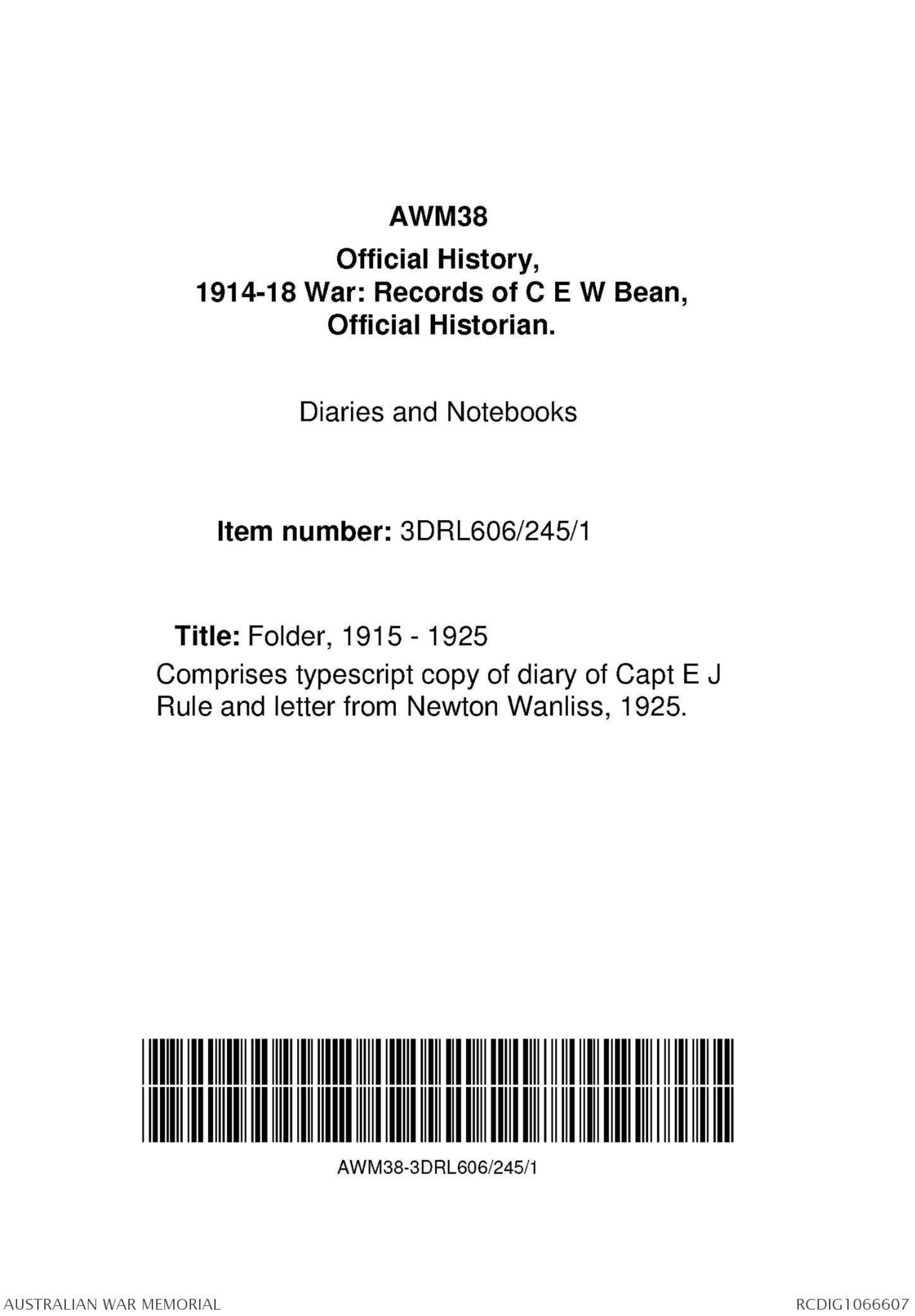
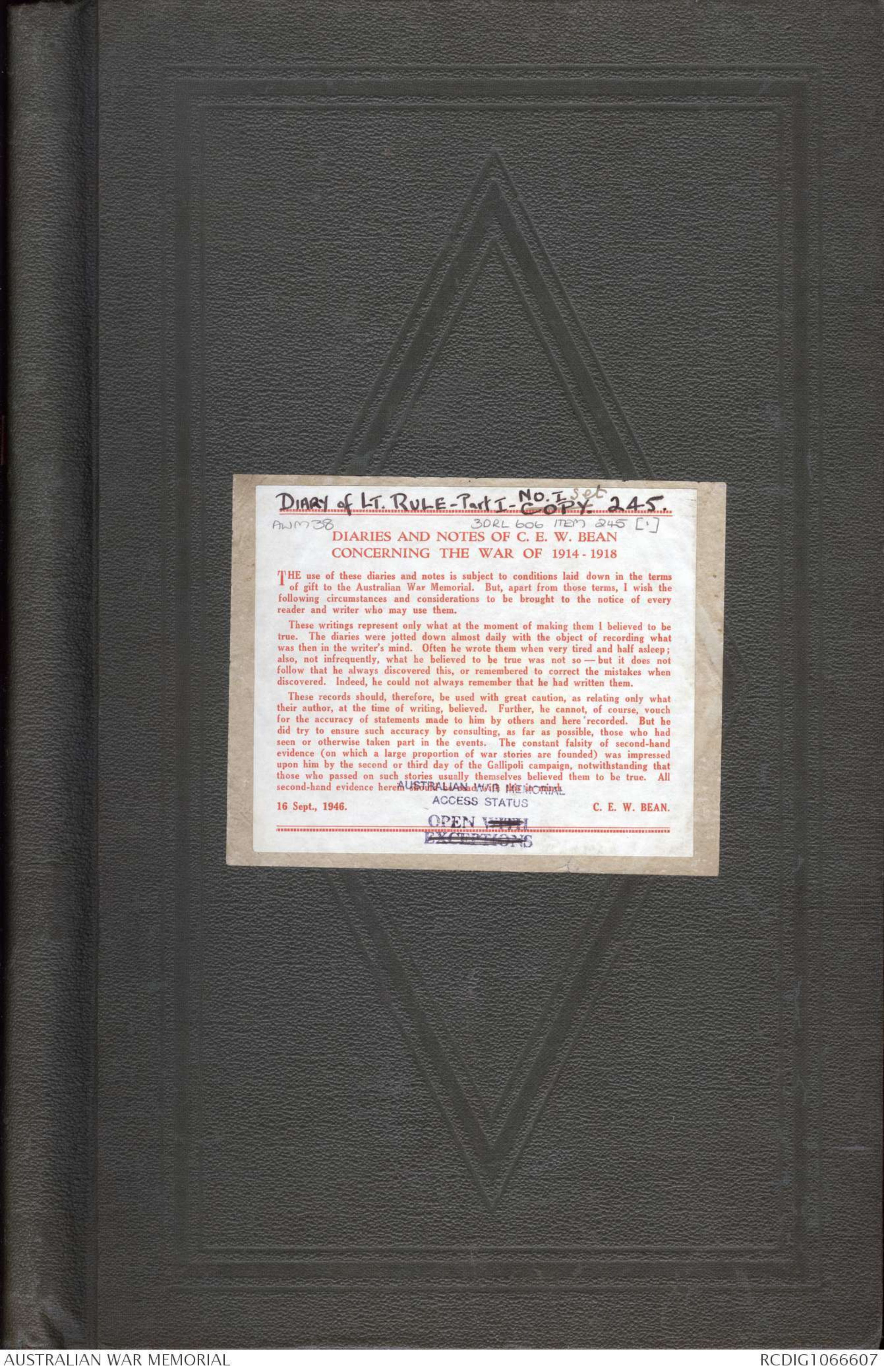
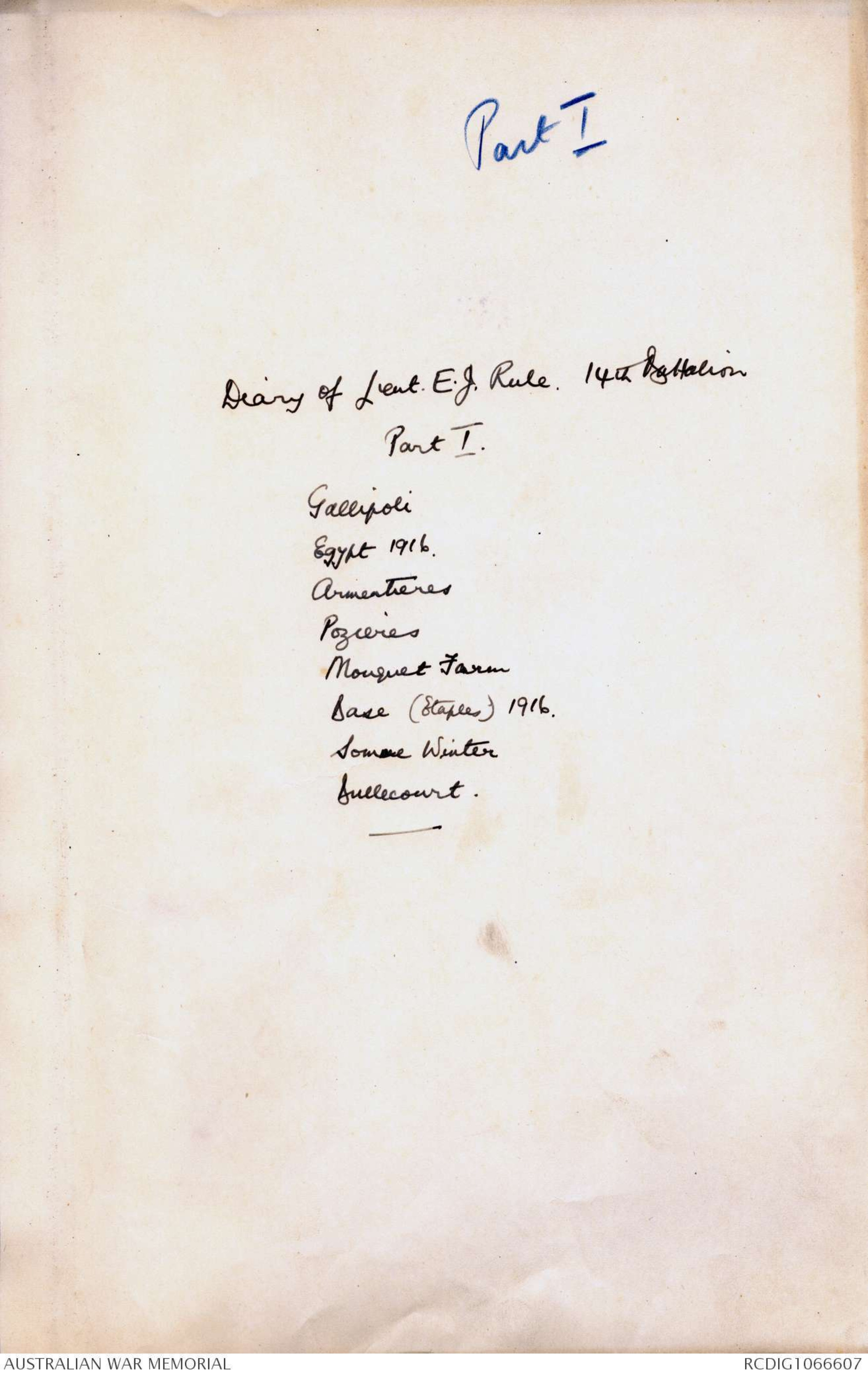
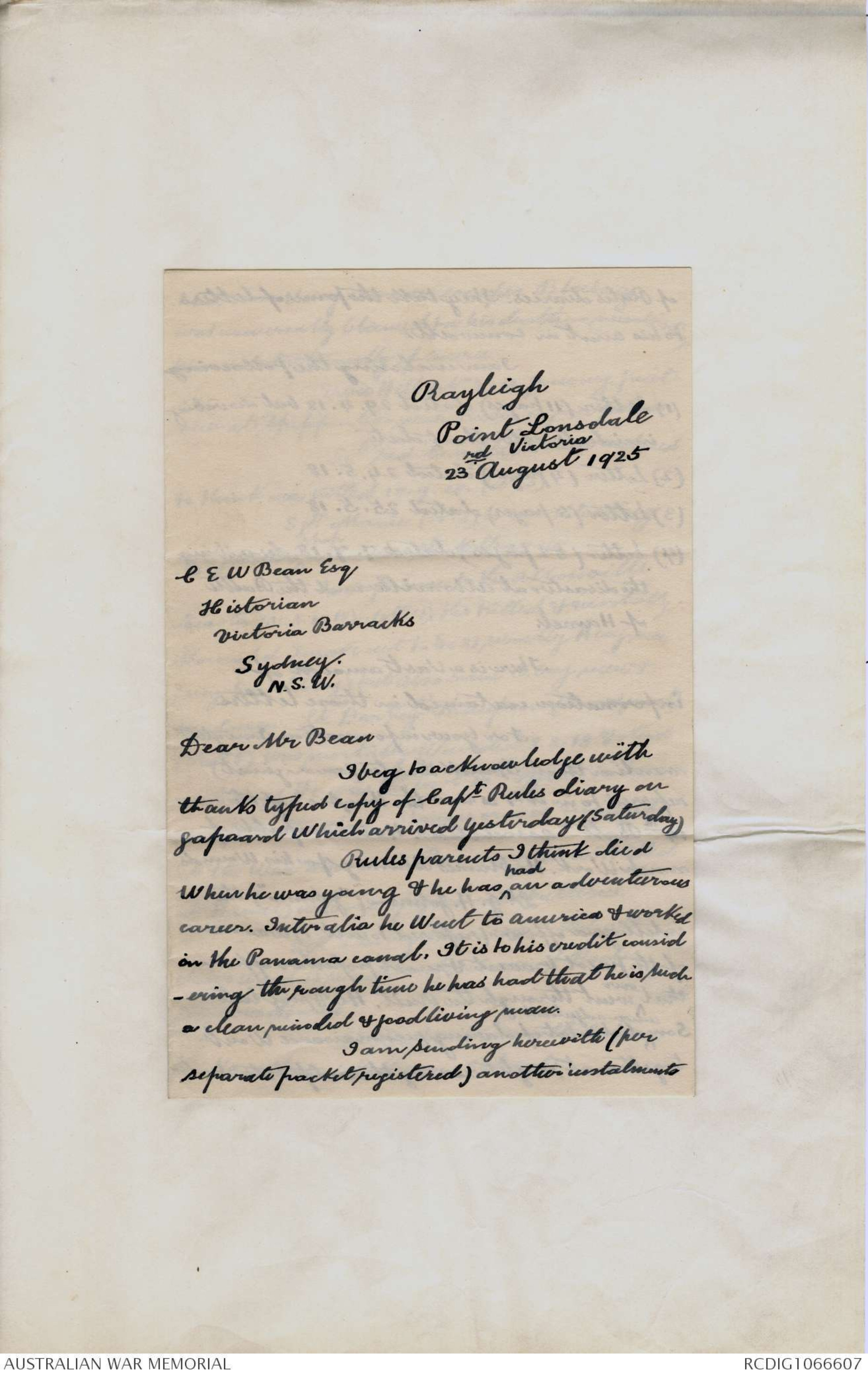
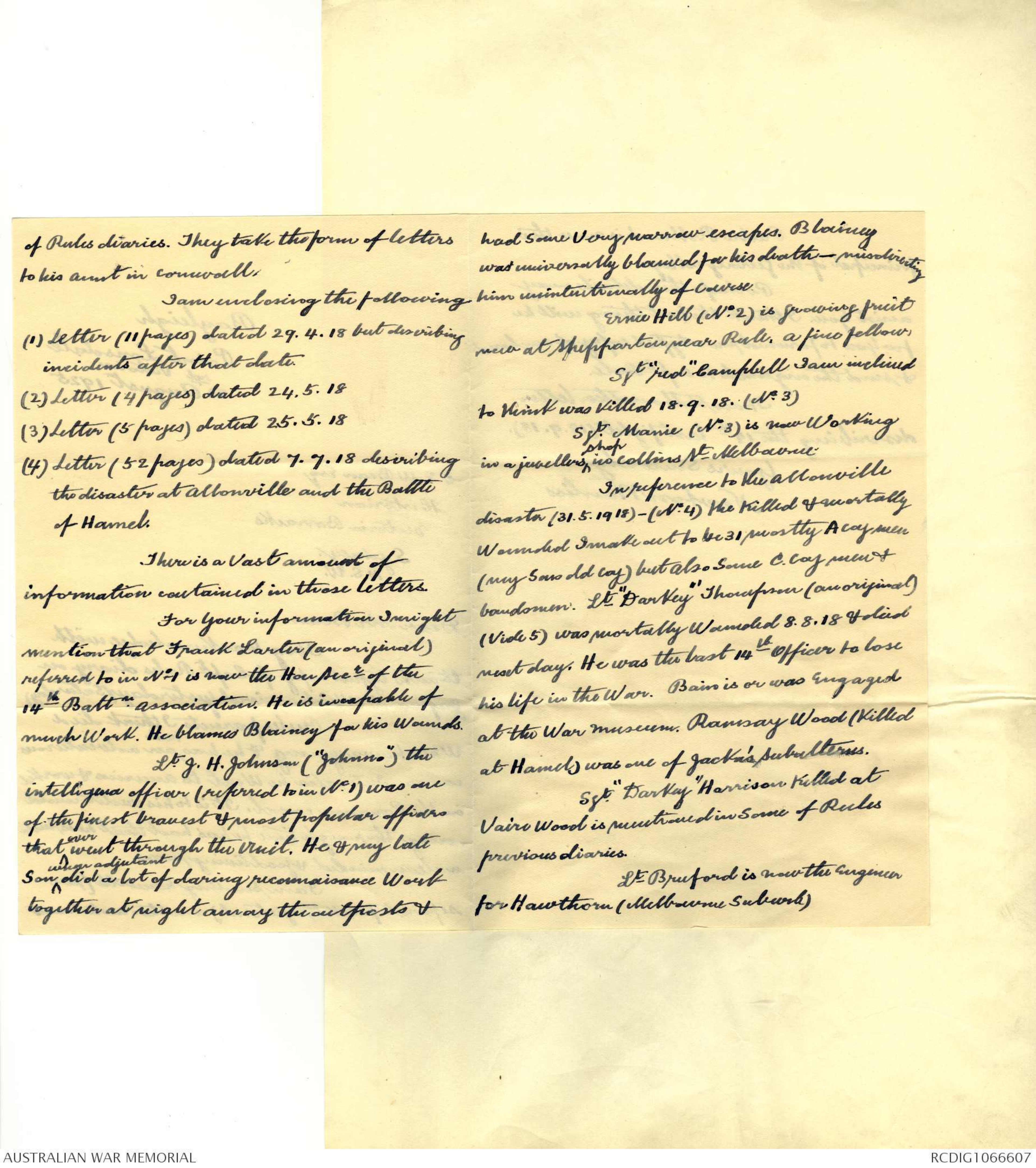
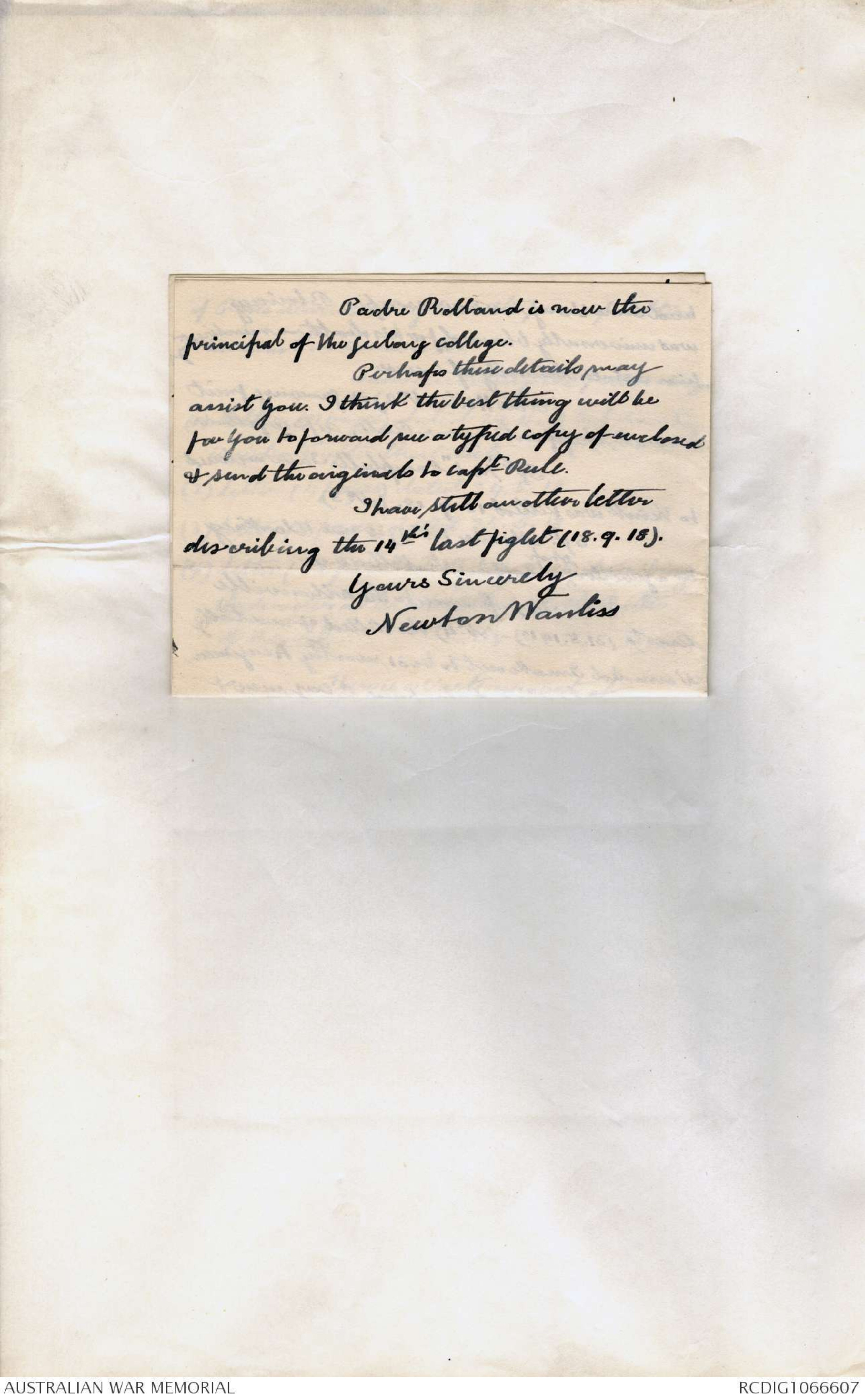
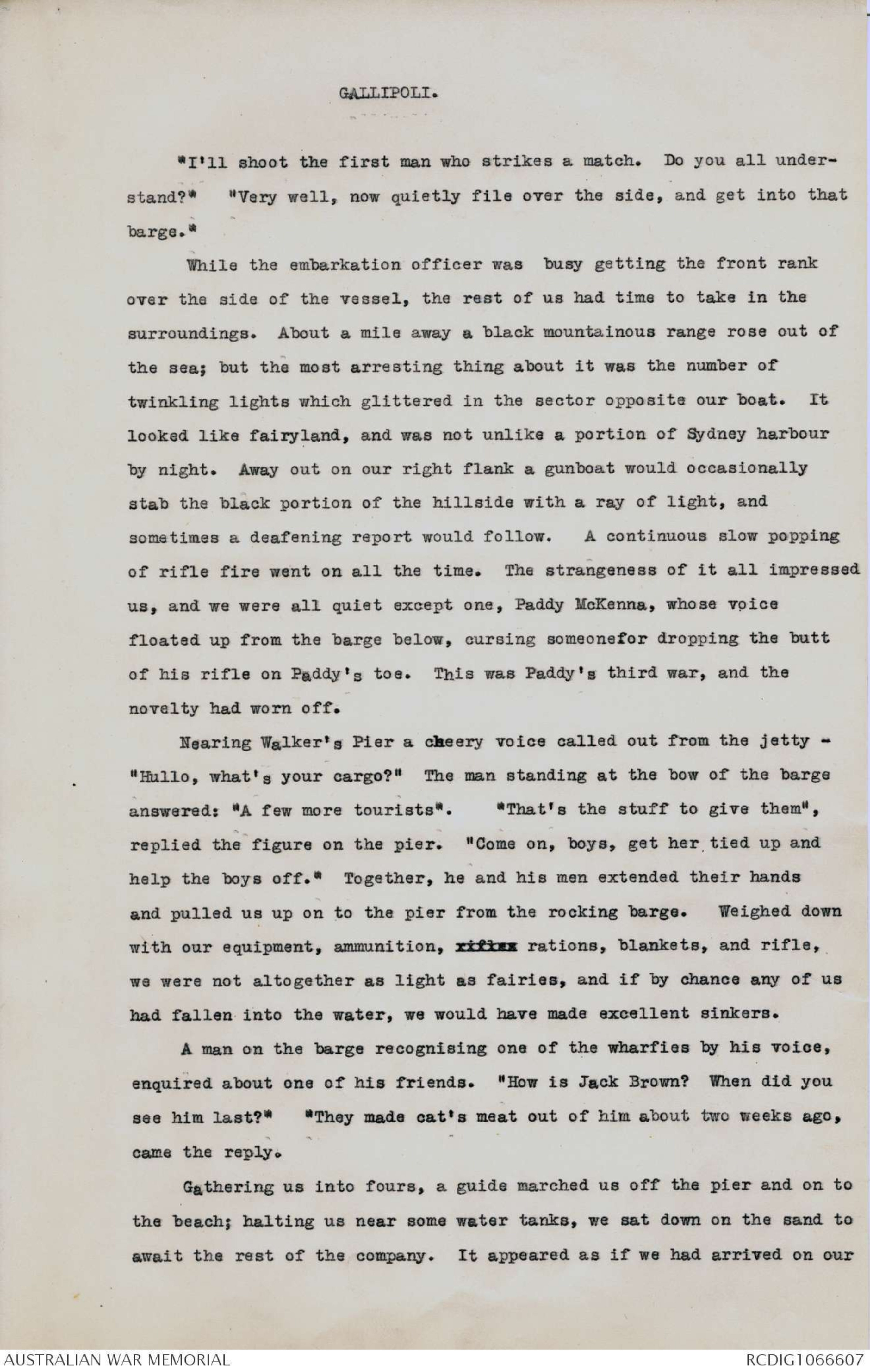
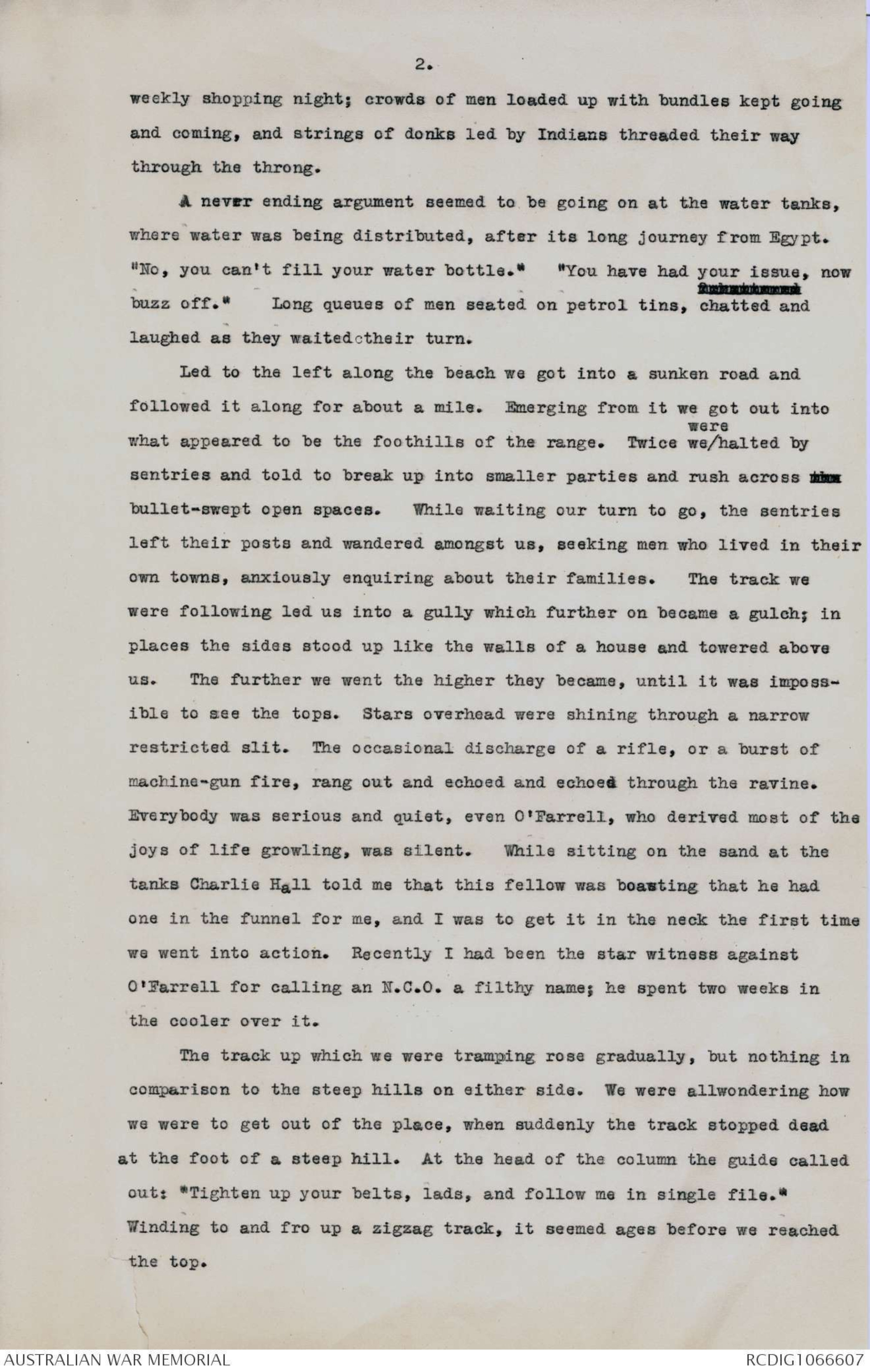
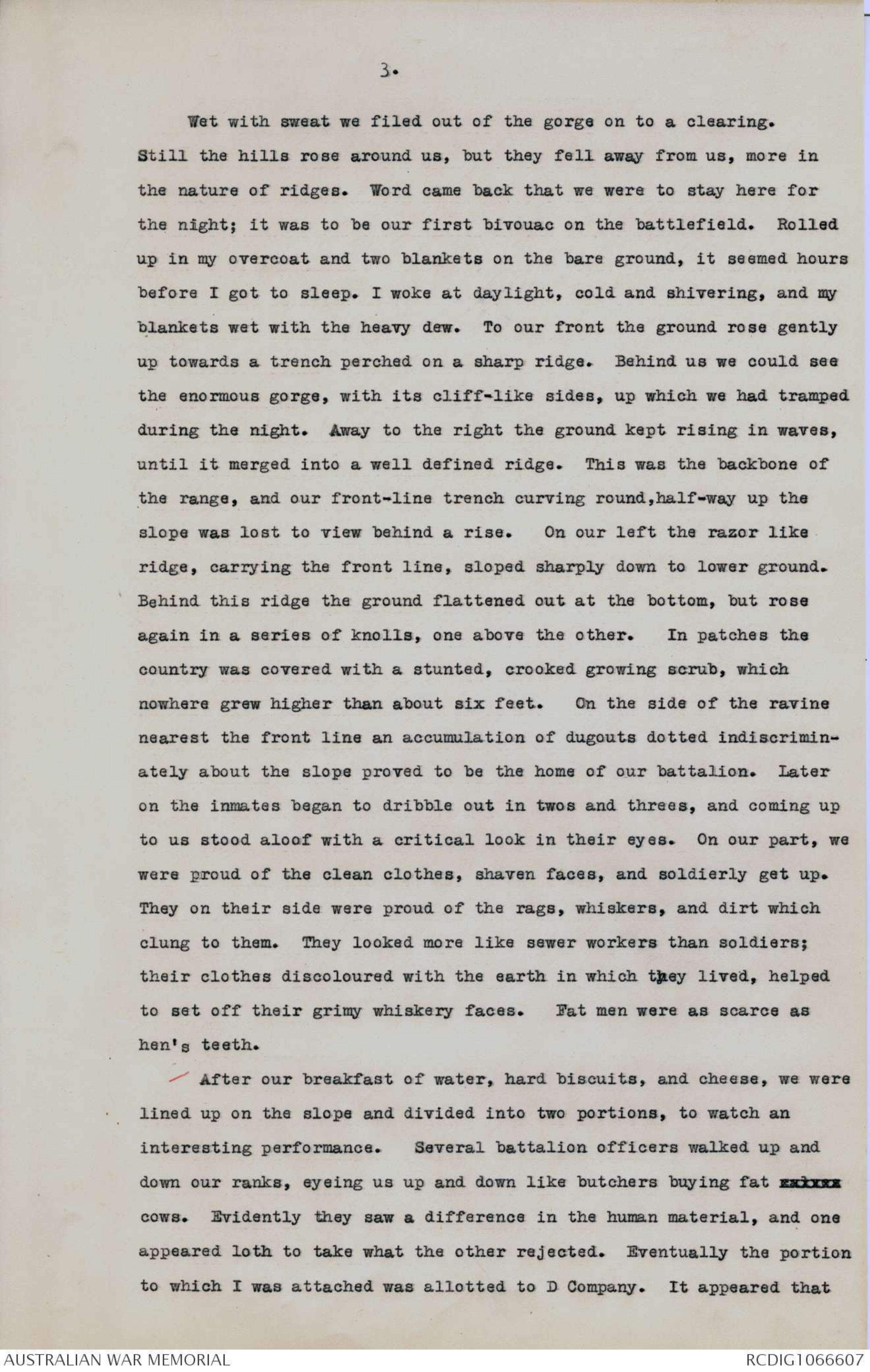
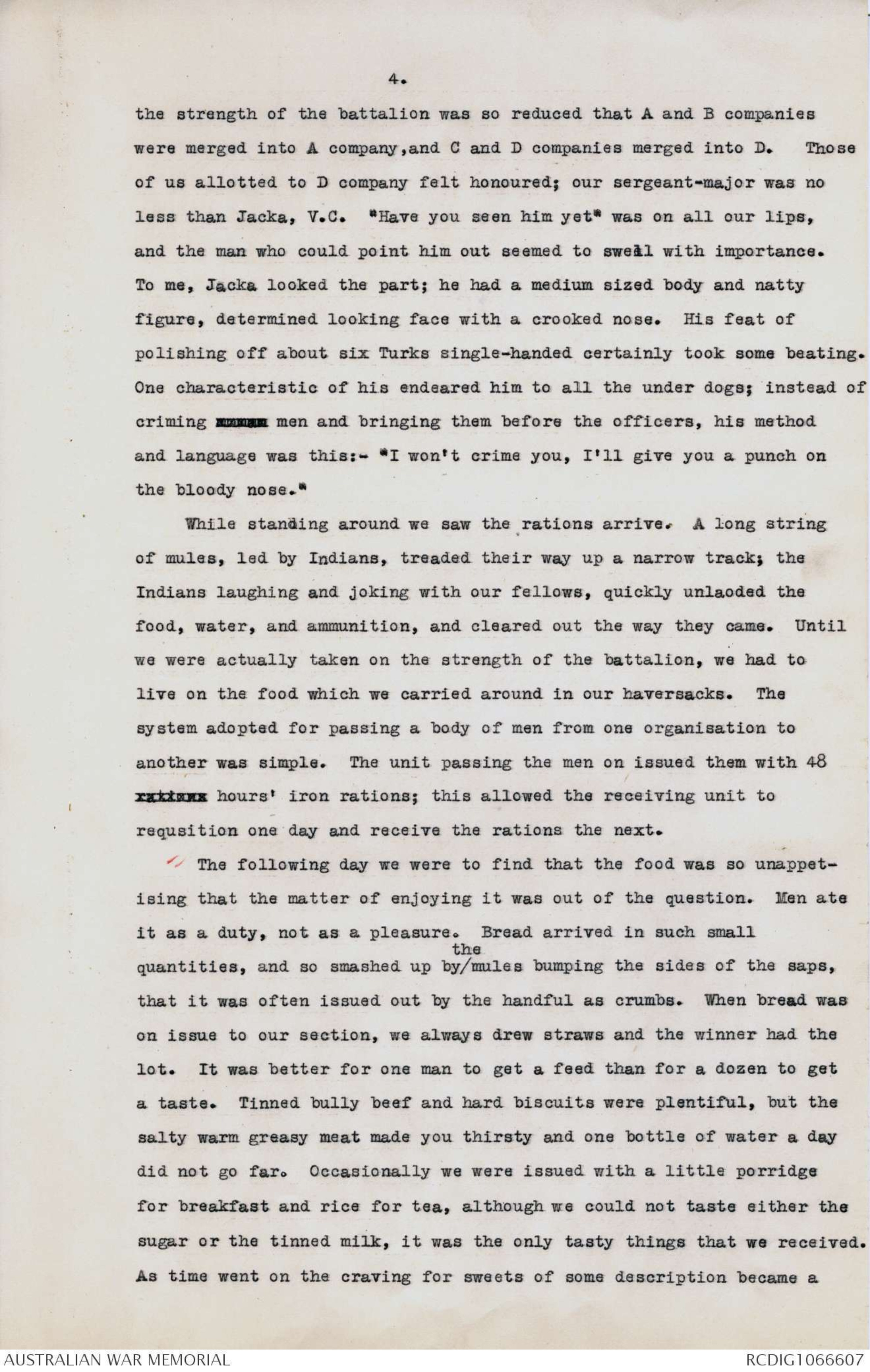
AWM38
Official History
1914 - 1918 War: Records of C E W Bean,
Official Historian.
Diaries and Notebooks
Item number: 3DRL606/245/1
Title: Folder, 1915 - 1925
Comprises typescript copy of diary of Capt E J
Rule and letter from Newton Wanliss, 1925.
AVM38-3DRL606/245/1
DIARY OF LT. RULE - Part 1 - Copy. No. 1 Set . 245
AWM 38
3DRL 606 Item 246 [1]
DIARIES AND NOTES OF C. E. W. BEAN
CONCERNING THE WAR OF 1914-1918
THE use of these diaries and notes is subject to conditions laid down in the terms
of gift to the Australian War Memorial. But, apart from those terms, I wish the
following circumstances and considerations to be brought to the notice of every
reader and writer who may use them.
These writings represent only what at the moment of making them I believed to be
true. The diaries were jotted down almost daily with the object of recording what
was then in the writers mind. Often he wrote them when very tired and half asleep;
also, not infrequently, what he believed to be true was not so –but it does not
follow that he always discovered this, or remembered to correct the mistakes when
discovered. Indeed, he could not always remember that he had written them.
These records should, therefore, be used with great caution, as relating only what
the author, at the time of writing believed. Further, he cannot of course, vouch
for the accuracy of statements made to him by others and here recorded. But he
did try to ensure such accuracy by consulting, as far as possible, those who had
seen or otherwise taken part in the events. The constant falsity, second-hand
evidence (on which a large proportion of war stories are founded) was impressed
upon him by the second or third day of the GalLipoli campaign, notwithstanding that
those who passed on such stories usually themselves believed them to be true. All
second hand evidence herein should be read with this in mind.
AUSTRALIAN WAR MEMORIAL
ACCESS STATUS
OPEN WITHEXCEPTIONS
16 Sept., 1946.
C E W. BEAN.
Part I
Diary of Lieut E. J. Rule. 14th Battalion
Part 1
Gallipoli
Egypt 1916
Armentieres
Pozieres
Mouquet Farm
Base (Etaples) 1916.
Somme Winter
Bullecourt.
Rayleigh
Point Lonsdale
Victoria
23rd August 1925
C.E.W.Bean Esq
Historian
Victoria Barracks
Sydney
N.S.W.
Dear Mr Bean
I beg to acknowledge with
thanks typed copy of Capt Rules diary on
Gapaard which arrived yesterday (Saturday)
Rules parents I think died
when he was young & he has ^had an adventurous
career. Interalia he went to America & worked
on the Panama canal. It is to his credit considering
the rough time he has had that he is such
a clean minded and good living person.
I am sending herewith (per
separate packet registered) another instalment
of Rules diaries. They take the form of letters
to his Aunt in Cornwall.
I am enclosing the following
(1) Letter (11 pages) dated 29.4.18 but describing
incidents after that date
(2) Letter (4 pages) dated 24.5.18
(3) Letter (5 pages) dated 25.5.18
(4) Letter (52 pages) dated 7.7.18 describing
the disaster at Allonville and the Battle
of Hamel.
There is a vast amount of
information contained in those letters.
For your information I might
mention that Frank Larter (an original)
referred to in No 1 is now the Hon Sect of the
14th Battn association. He is incapable of
much work. He blames Blainey for his wounds.
Lt. J.H. Johnson (“Johnno") the
intelligence officer (referred to in No 1) was one
of the finest bravest & most popular officers
that ^ever went through the unit. He & my late
Son^ when adjutant did a lot of daring reconnaissance work
together at night away the outposts &
had some very narrow escapes. Blainey
was universally blamed for his death - misdirecting
him unintentionally of course.
Ernie Hill (No2) is growing fruit
now at Shepparton, near Rule, a fine fellow.
Sgt “red" Campbell I am inclined
to think was killed 18.9.18 (No3)
Sgt Manie (No3) is now working
in a jewellers ^shop in Collins St Melbourne.
In reference to the Allonville
disaster (31.8.1918) - (No4) the killed & mortally
wounded I make out to be 31 mostly A coy men
(my Sons old Coy) but also some C. Coy men &
bandsmen. Lt “Darkey” Thompson (an original)
(Vide 5) was mortally wounded 8.8.18 & died
next day. He was the last 14th Officer to lose
his life in the War. Bain is or was engaged
at the War Museum. Ramsay Wood (killed
at Hamel) was one of Jacka's subalterns
Sgt. “Darkey” Harrison killed at
Vaire Wood is mentioned in some of Rules
previous diaries.
Lt Bruford is now the Engineer
for Hawthorn (Melbourne suburb)
Padre Rolland is now the
Principal of the Geelong College.
Perhaps these details may
assist you. I think the best thing will be
for you to forward me a typed copy of enclosed
& send the originals to Capt Rule.
I have still another letter
describing the 14th's last fight (18.9.18).
Yours sincerely
Newton Wanliss.
GALLIPOLI.
"I’ll shoot the first man who strikes a match. Do you all understand?"
"Very well, now quietly file over the side, and get into that
barge.”
While the embarkation officer was busy getting the front rank
over the side of the vessel, the rest of us had time to take in the
surroundings. About a mile away a black mountainous range rose out of
the sea; but the most arresting thing about it was the number of
twinkling lights which glittered in the sector opposite our boat. It
looked like fairyland, and was not unlike a portion of Sydney harbour
by night. Away out on our right flank a gunboat would occasionally
stab the black portion of the hillside with a ray of light, and
sometimes a deafening report would follow. A continuous slow popping
of rifle fire went on all the time. The strangeness of it all impressed
us, and we were all quiet except one, Paddy McKenna, whose voice
floated up from the barge below, cursing someonefor dropping the butt
of his rifle on Paddy's toe. This was Paddy's third war, and the
novelty had worn off.
Nearing Walker's Pier a cheery voice called out from the jetty -
"Hullo, what's your cargo?" The man standing at the bow of the barge
answered: "A few more tourists". "That's the stuff to give them",
replied the figure on the pier. "Come on, boys, get her tied up and
help the boys off." Together, he and his men extended their hands
and pulled us up on to the pier from the rocking barge. Weighed down
with our equipment, ammunition, rifles, rations, blankets, and rifle,
we were not altogether as light as fairies, and if by chance any of us
had fallen into the water, we would have made excellent sinkers.
A man on the barge recognising one of the wharfies by his voice,
enquired about one of his friends. "How is Jack Brown? When did you
see him last?" "They made cat's meat out of him about two weeks ago,
came the reply.
Gathering us into fours, a guide marched us off the pier and on to
the beach; halting us near some water tanks, we sat down on the sand to
await the rest of the company. It appeared as if we had arrived on our
2.
weekly shopping night; crowds of men loaded up with bundles kept going
and coming, and strings of donks led by Indians threaded their way
through the throng.
A never ending argument seemed to be going on at the water tanks,
where water was being distributed, after its long journey from Egypt.
"No, you can't fill your water bottle." "You have had your issue, now
buzz off." Long queues of men seated on petrol tins, xxxxxxxx chatted and
laughed as they waited their turn.
Led to the left along the beach we got into a sunken road and
followed it along for about a mile. Emerging from it we got out into
what appeared to be the foothills of the range. Twice we/were halted by
sentries and told to break up into smaller parties and rush across the
bullet-swept open spaces. While waiting our turn to go, the sentries
left their posts and wandered amongst us, seeking men who lived in their
own towns, anxiously enquiring about their families. The track we
were following led us into a gully which further on became a gulch; in
places the sides stood up like the walls of a house and towered above
us. The further we went the higher they became, until it was impossible
to see the tops. Stars overhead were shining through a narrow
restricted slit. The occasional discharge of a rifle, or a burst of
machine-gun fire, rang out and echoed and echoed through the ravine.
Everybody was serious and quiet, even O'Farrell, who derived most of the
joys of life growling, was silent. While sitting on the sand at the
tanks Charlie Hall told me that this fellow was boasting that he had
one in the funnel for me, and I was to get it in the neck the first time
we went into action. Recently I had been the star witness against
O'Farrell for calling an N.C.O. a filthy name; he spent two weeks in
the cooler over it.
The track up which we were tramping rose gradually, but nothing in
comparison to the steep hills on either side. We were allwondering how
We were to get out of the place, when suddenly the track stopped dead
at the foot of a steep hill. At the head of the column the guide called
out: "Tighten up your belts, lads, and follow me in single file."
Winding to and fro up a zigzag track, it seemed ages before we reached
the top.
3.
Wet with sweat we filed out of the gorge on to a clearing.
Still the hills rose around us, but they fell away from us, more in
the nature of ridges. Word came back that we were to stay here for
the night; it was to be our first bivouac on the battlefield. Rolled
up in my overcoat and two blankets on the bare ground, it seemed hours
before I got to sleep. I woke at daylight, cold and shivering, and my
blankets wet with the heavy dew. To our front the ground rose gently
up towards a trench perched on a sharp ridge. Behind us we could see
the enormous gorge, with its cliff-like sides, up which we had tramped
during the night. Away to the right the ground kept rising in waves,
until it merged into a well defined ridge. This was the backbone of
the range, and our front-line trench curving round, half-way up the
slope was lost to view behind a rise. On our left the razor like
ridge, carrying the front line, sloped sharply down to lower ground.
Behind this ridge the ground flattened out at the bottom, but rose
again in a series of knolls, one above the other. In patches the
country was covered with a stunted, crooked growing scrub, which
nowhere grew higher than about six feet. On the side of the ravine
nearest the front line an accumulation of dugouts dotted indiscriminately
about the slope proved to be the home of our battalion. Later
on the inmates began to dribble out in twos and threes, and coming up
to us stood aloof with a critical look in their eyes. On our part, we
were proud of the clean clothes, shaven faces, and soldierly get up.
They on their side were proud of the rags, whiskers, and dirt which
clung to them. They looked more like sewer workers than soldiers;
their clothes discoloured with the earth in which they lived, helped
to set off their grimy whiskery faces. Fat men were as scarce as
hen's teeth.
After our breakfast of water, hard biscuits, and cheese, we were
lined up on the slope and divided into two portions, to watch an
interesting performance. Several battalion officers walked up and
down our ranks, eyeing us up and down like butchers buying fat xxxxxx
cows. Evidently they saw a difference in the human material, and one
appeared loth to take what the other rejected. Eventually the portion
to which I was attached was allotted to D Company. It appeared that
4.
the strength of the battalion was so reduced that A and B companies
were merged into A company,and C and D companies merged into D. Those
of us allotted to D company felt honoured; our sergeant-major was no
less than Jacka, V.C. "Have you seen him yet" was on all our lips,
and the man who could point him out seemed to swell with importance.
To me, Jacka looked the part; he had a medium sized body and natty
figure, determined looking face with a crooked nose. His feat of
polishing off about six Turks single-handed certainly took some beating.
One characteristic of his endeared him to all the under dogs; instead of
criming xxxxx men and bringing them before the officers, his method
and language was this:- "I won't crime you, I'll give you a punch on
the bloody nose."
While standing around we saw the rations arrive. A long string
of mules, led by Indians, treaded their way up a narrow track; the
Indians laughing and joking with our fellows, quickly unloaded the
food, water, and ammunition, and cleared out the way they came. Until
we were actually taken on the strength of the battalion, we had to
live on the food which we carried around in our haversacks. The
system adopted for passing a body of men from one organisation to
another was simple. The unit passing the men on issued them with 48rations hours' iron rations; this allowed the receiving unit to
requisition one day and receive the rations the next.
The following day we were to find that the food was so unappetising
that the matter of enjoying it was out of the question. Men ate
it as a duty, not as a pleasure. Bread arrived in such small
quantities, and so smashed up by/the mules bumping the sides of the saps,
that it was often issued out by the handful as crumbs. When bread was
on issue to our section, we always drew straws and the winner had the
lot. It was better for one man to get a feed than for a dozen to get
a taste. Tinned bully beef and hard biscuits were plentiful, but the
salty warm greasy meat made you thirsty and one bottle of water a day
did not go far. Occasionally we were issued with a little porridge
for breakfast and rice for tea, although we could not taste either the
sugar or the tinned milk, it was the only tasty things that we received.
As time went on the craving for sweets of some description became a
 Deb Parkinson
Deb ParkinsonThis transcription item is now locked to you for editing. To release the lock either Save your changes or Cancel.
This lock will be automatically released after 60 minutes of inactivity.